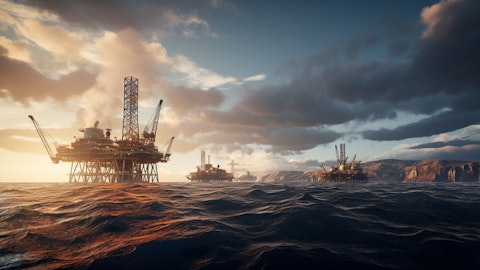George Maxwell: Thank you, operator. I think it’s, I’m very pleased to be partied to another successful set of results for Q1 where the company has performed well, our assets are performing well. We continue to streamline and become more efficient in each of our areas of operation. And as asked by a couple of questionnaires, we continue to look at opportunities in the marketplace where we can see where the skill sets that we have inside the company of operational excellence can add value to our shareholder base. With that in mind, when we look through the guidance for 2024, we see that guidance levels being maintained. We see the production in each of our areas of operation in Gabon and in Egypt and, as [indiscernible] just mentioned, in Canada improving.
We’ll be able to talk more about Cote d’Ivoire in the coming quarters and how that’s performing and what the longer-term plans are once we’ve had discussions with the operator. And to that end, we’re starting to build a much more diversified portfolio company that is able to be a much more sustainable on its delivery. And for that, thank you very much.
Al Petrie: Operator?
Operator: Yes, we do have one more question from Charlie Sharp with Canaccord.
Q – Charlie Sharp: Gentlemen, I do apologize. I had some phone problems, so I had to redial. Just one very quick follow-up question and a sort of slightly longer element to it, if I may. In Egypt, the results of the workovers in Q1, one or two of them have been quite good, others less good. I guess the first question really is what is it that you look for that might make you commit to the second half workover program? And then the bigger question is really given the range of projects that you now have, particularly in West Africa and in Canada, in terms of capital allocation. Is Egypt looking particularly with the issues there and uncertainties? Is Egypt looking less compelling to you than perhaps it did 12 months ago?
A – George Maxwell: Let me take it in a number of parts there, Charlie. The first thing with regard to the drilling campaign in Egypt. So, we have the potential of a 12 to 15 well drilling campaign with an additional CapEx spend of around $18 million as we execute that campaign. The key contingency around that campaign right now is access to the drilling rig and the availability of equipment as opposed to the availability of target opportunities to drill. So, where we are for this year, primarily in 2024, if we can secure and overcome those contingent elements, we will drill in Egypt because it will add additional production and that will, even with the capital allocation issues, will improve the PSC positions inside Egypt. Now obviously, if we become more restricted in capital allocation, then the economic returns will be far more compelling. That will start to be some of the drivers in capital allocation. And I’ll pass over to Ron.
A – Ron Bain: Charlie, what I would add to that, I mean, George is exactly right. We’ve got a number of things going on. As you know, Egypt, it’s a liquidity problem there. Liquidity problem, this liquidity issue is certainly improving. You saw the World Bank. You saw the land sales that they had, the UAE. They devalued their currency, obviously, trying to control inflation on the interest rates as well. So, there’s a number of things there that certainly looks more positive and where we were looking maybe in Q3, Q4 of 2023. But it’s going to be a bit of a slow ride there. It’s not going to be as quick as everyone would want it to be. And obviously, we’re working with the state and EGPCs closely, as all our peer group are. The other thing I would add in relation to the production decline in Egypt is that we are imminently taking in a second workover unit.
So, we sourced a second workover unit. That will be taken in, in Q2. So, we’ll have two workover units working through effectively through the next three months. So regardless of the discussion on the drilling campaign, two workover units will certainly help the rest production decline.
A – Thor Pruckl: If I can just add to that, when we are drilling in Egypt, the drilling rig actually only does the drilling and the workover rig does the workovers. So, in order to minimize downtime on wells that need workovers, we’re bringing in the second rig, the workover rig for that exact purpose to support the drilling rig when the drilling program starts up.
End of Q&A:
Al Petrie: Okay. Operator, I think that was your last question, correct?
Operator: That is the last question. So, the conference has now concluded. Thank you for attending today’s presentation. You may now disconnect.
Follow Vaalco Energy Inc (NYSE:EGY)
Follow Vaalco Energy Inc (NYSE:EGY)
Receive real-time insider trading and news alerts




